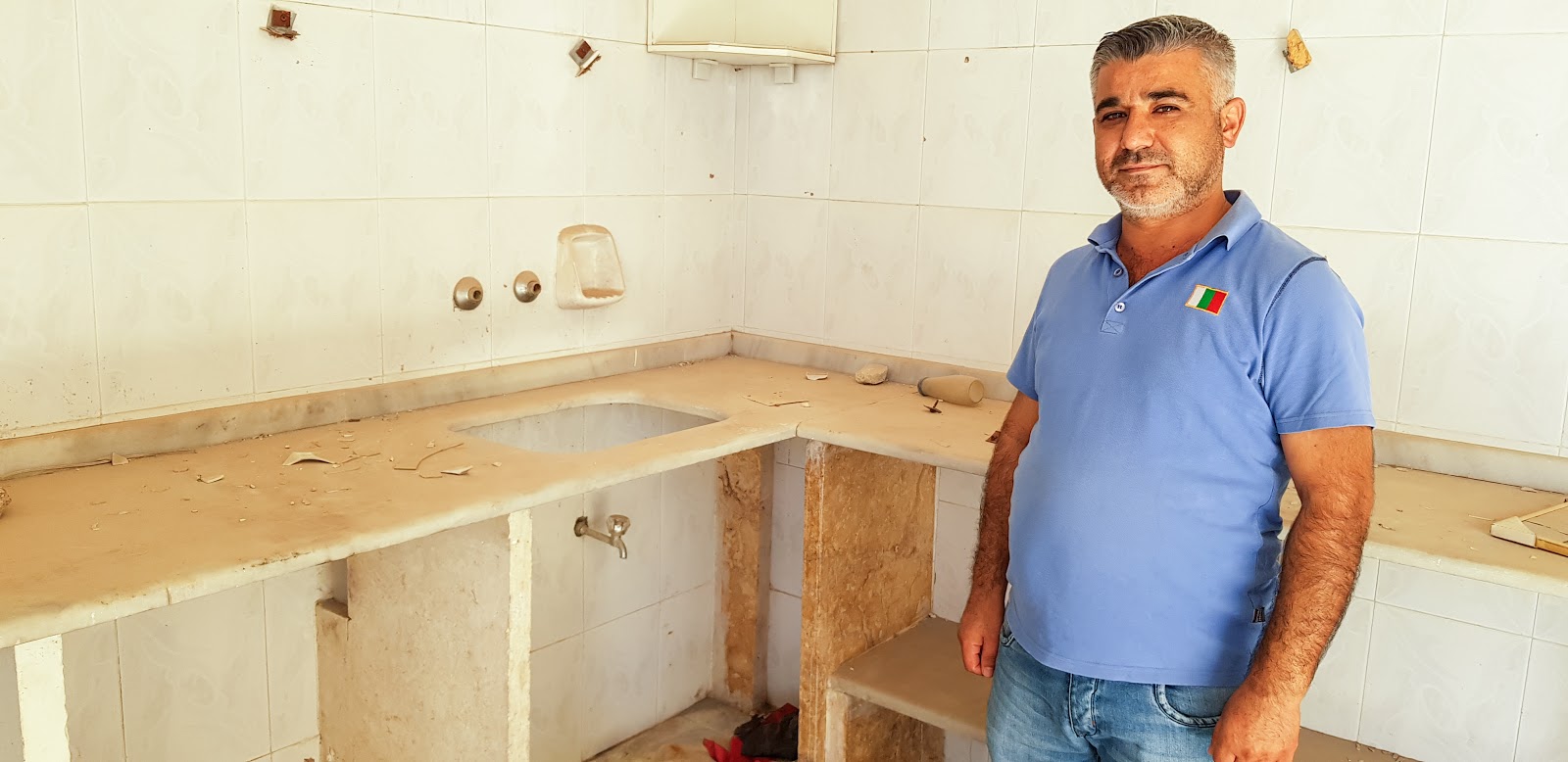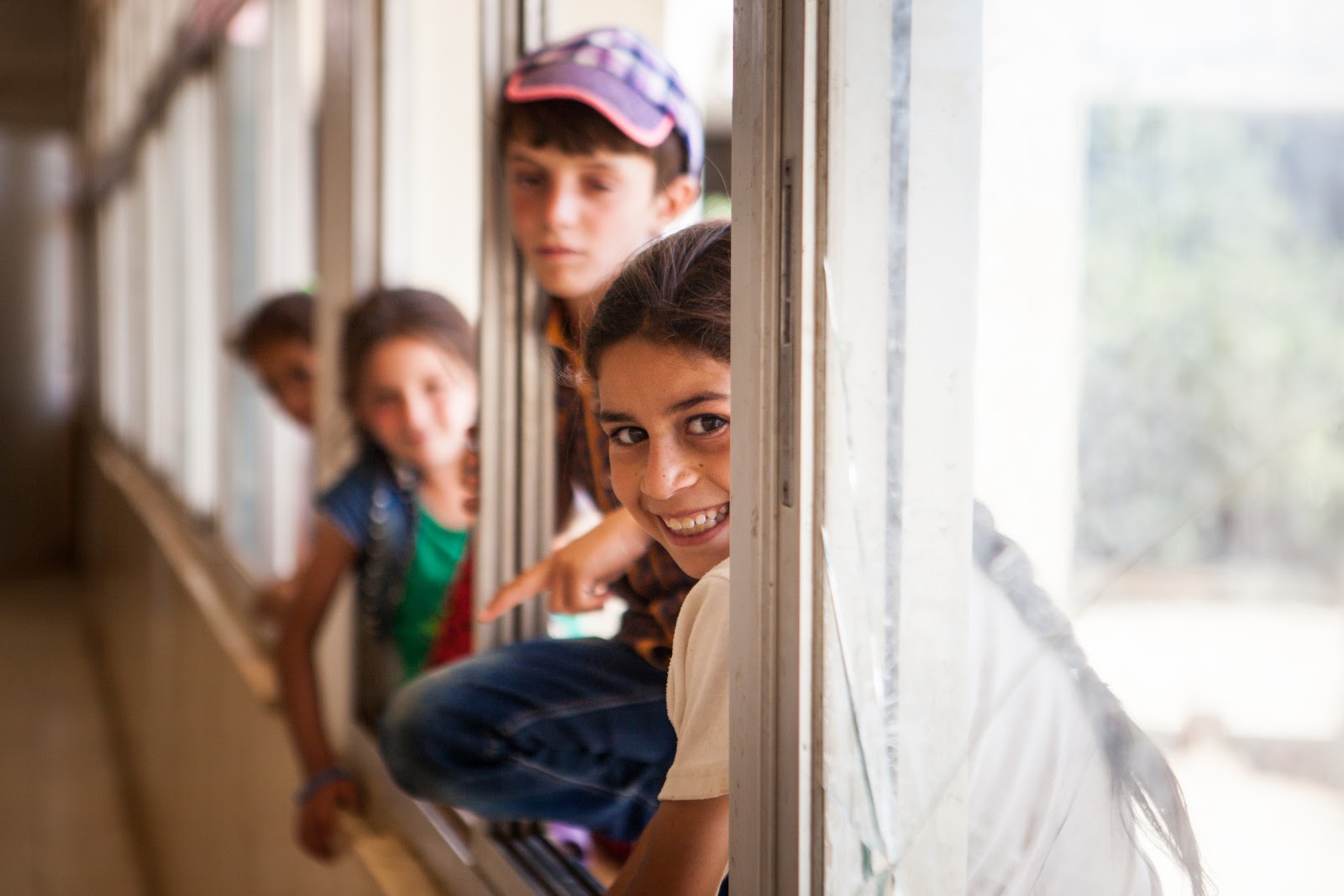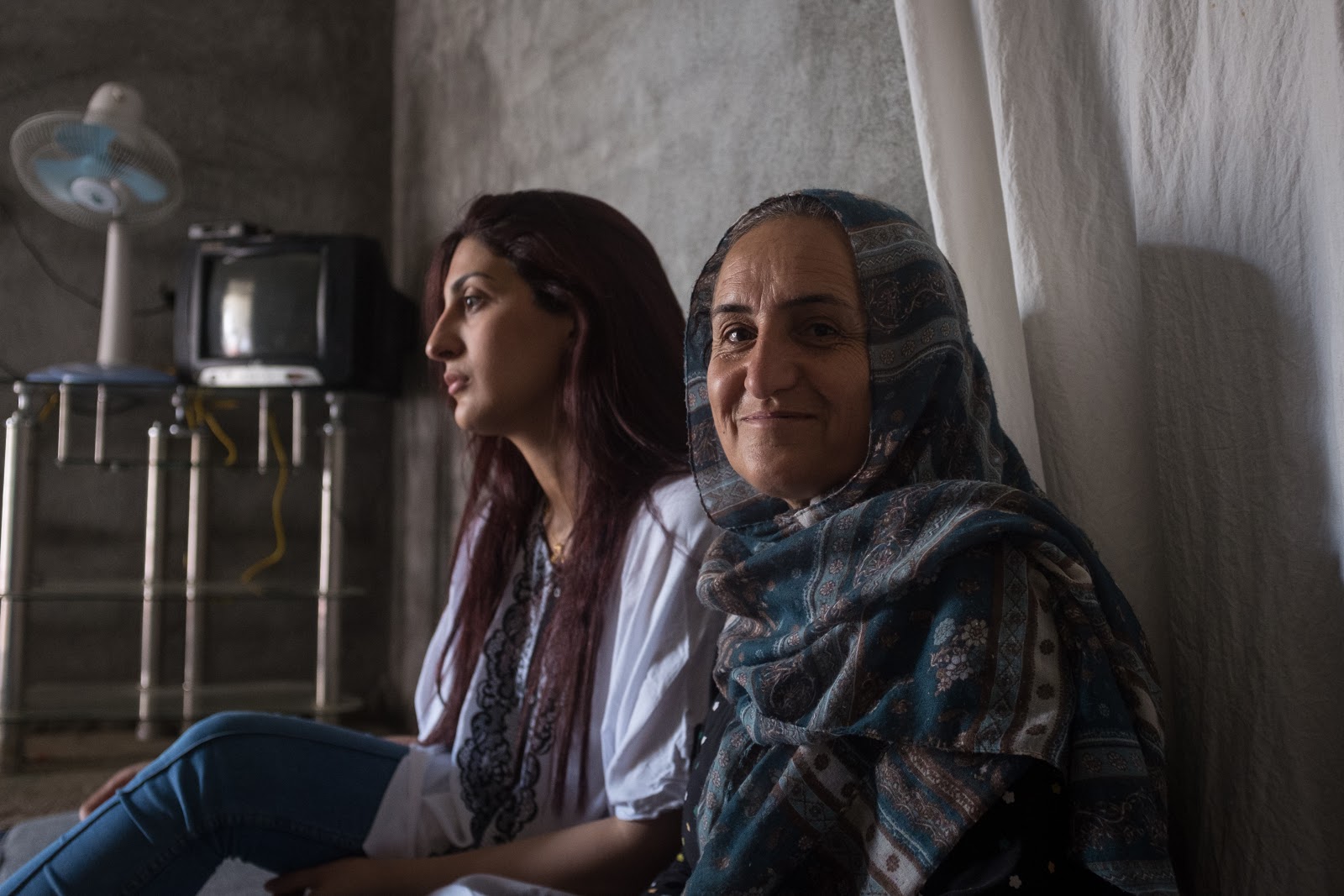
Episode 6: The Way Home
What makes home feel like home? Co-founder Jessica Courtney shares stories from friends in Iraq and Syria who have been displaced and are now remaking their homes. We also hear Jessica tour farms and homes being rebuilt after war.
Share this episode
Show Notes
Just what is it that makes home feel like home? As our work has shown us, restoring homes ruined by war is a first step to bringing whole communities back to life. Every pane of glass, every doorway secured, every kitchen and bathroom refurbished gives one more family what they need to come home, so they can start rebuilding the rest of their life.
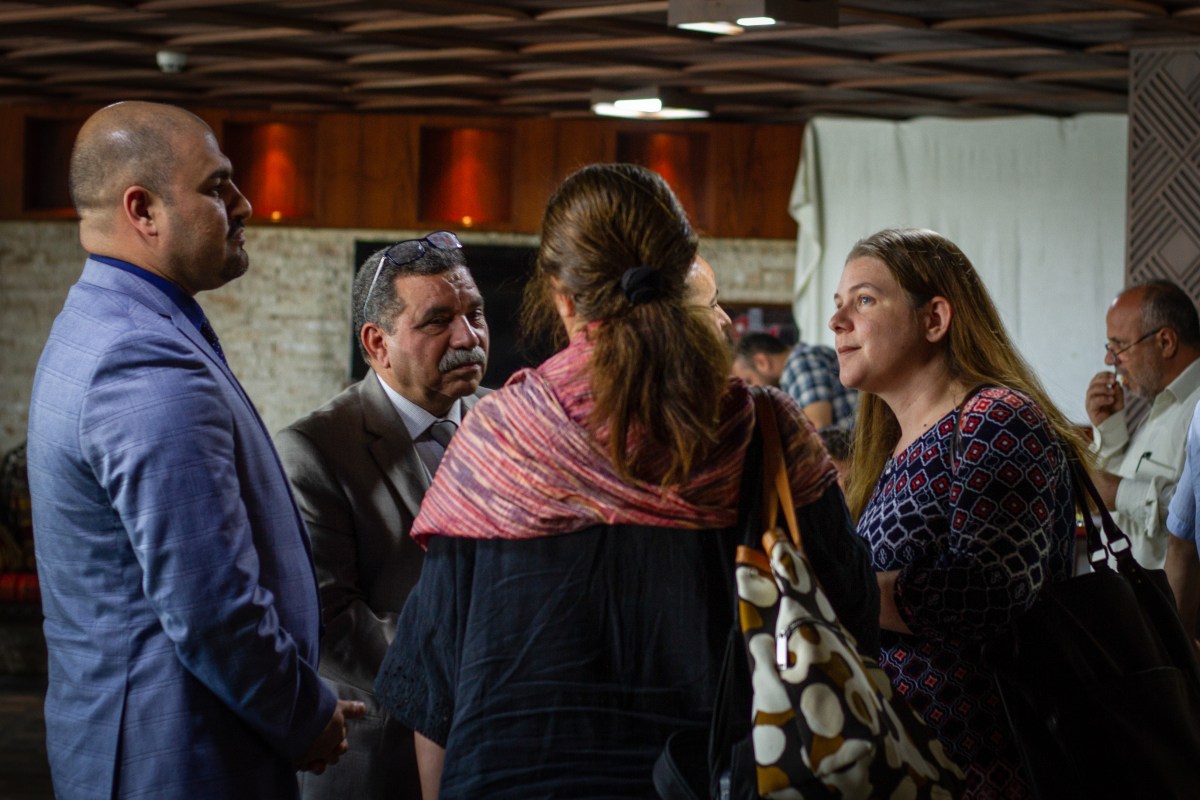
On this episode, Preemptive Love co-founder Jessica Courtney sits down with Love Anyway host Erin Wilson to share stories of her Iraqi and Syrian friends who have been displaced and are now remaking their homes. We also hear never-before-heard stories from the field, as Jessica shares her experiences visiting homes that are being built after being destroyed by war.
Jessica has long believed we should do more for those whose lives are disrupted by war—not merely helping them endure the present, but empowering them to reclaim their future. As the refugee crisis exploded in Syria and Iraq, Jessica began forming relationships with displaced women. Today, she leads our job creation program, benefiting displaced people from all backgrounds in Iraq and Syria.
In this final episode of Love Anyway’s first season, you’ll hear stories about:
- Jessica Courtney lives in Iraq with her husband Jeremy and their two children. She shares about what home means to them, and how her views of home have changed over time. Read an essay from Jessica.
- Jameela was displaced from her home in Syria. She became a mentor to many women in a displacement camp and a dear friend to Jessica. In this episode, we hear about the one item that represents home to Jameela. Learn more about Jameela (and even see a photo of her with podcast host Erin).
- Sami and Fahti are brothers whose village, on the outskirts of Mosul, was one of the last to be taken over by ISIS. They’re now rebuilding their homes. Learn how they’ve restored home.
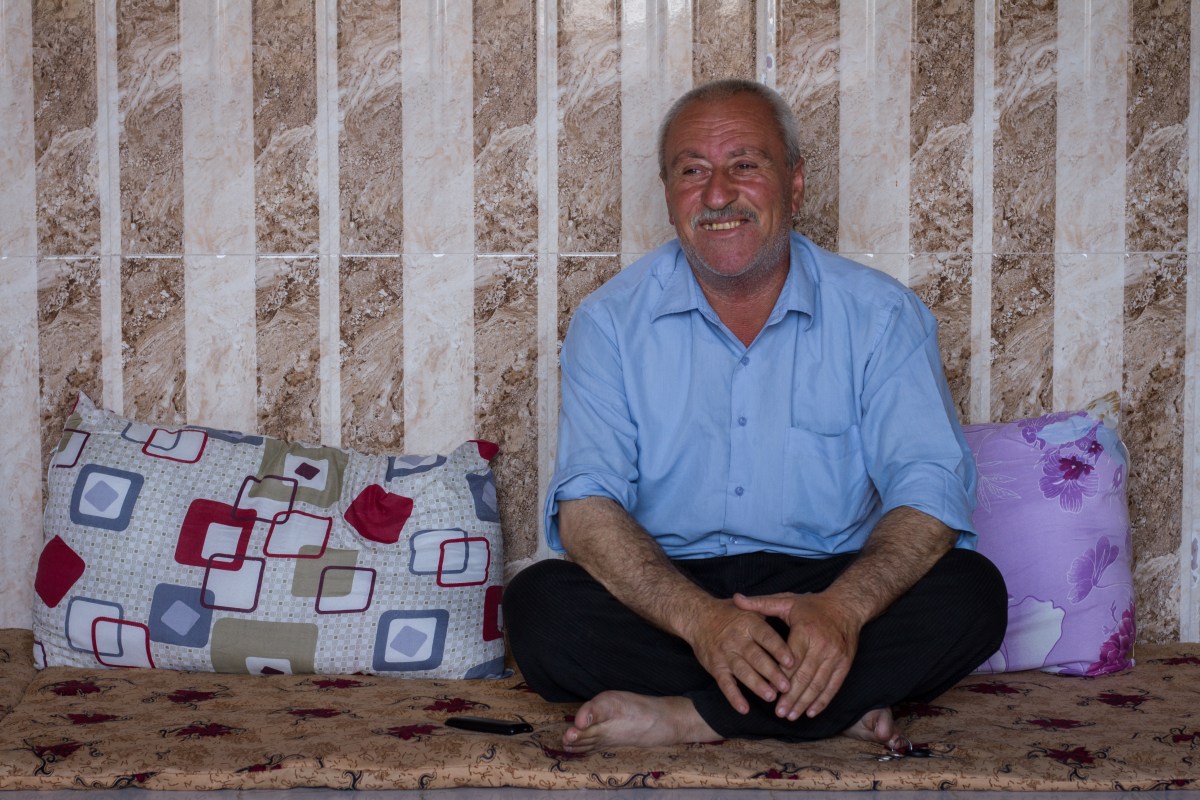
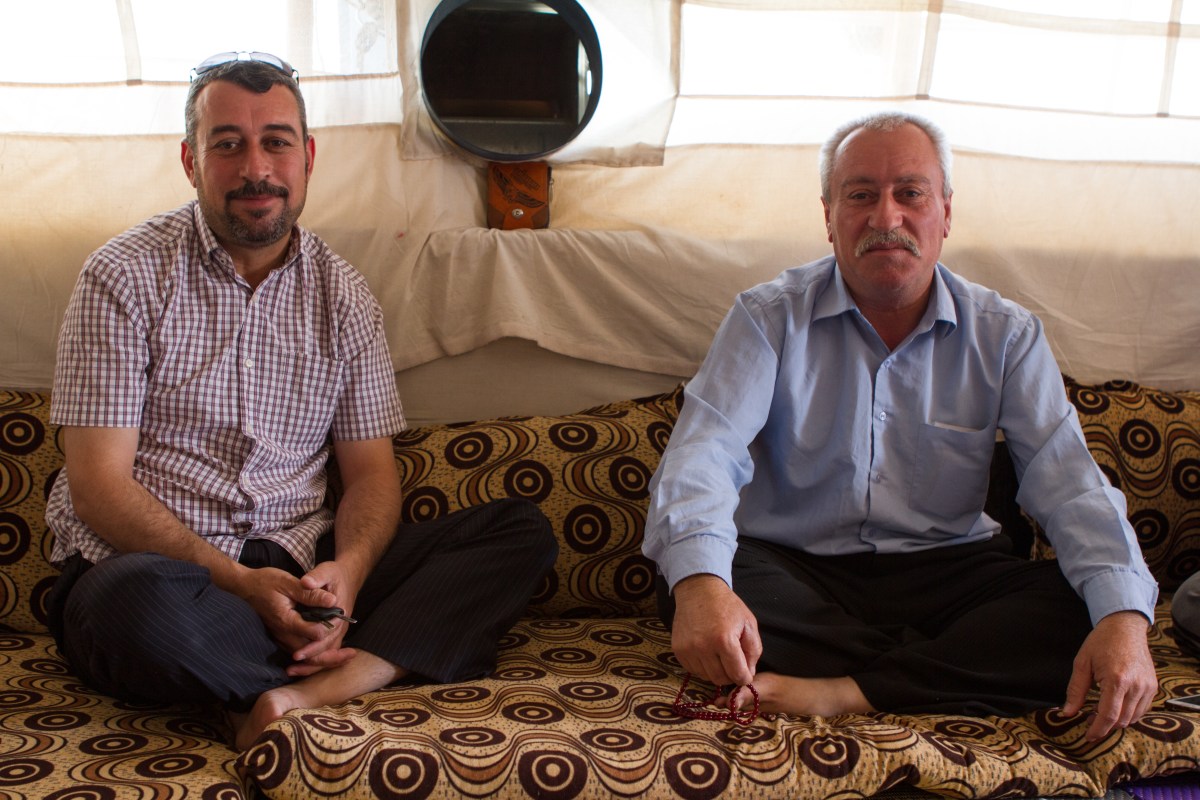
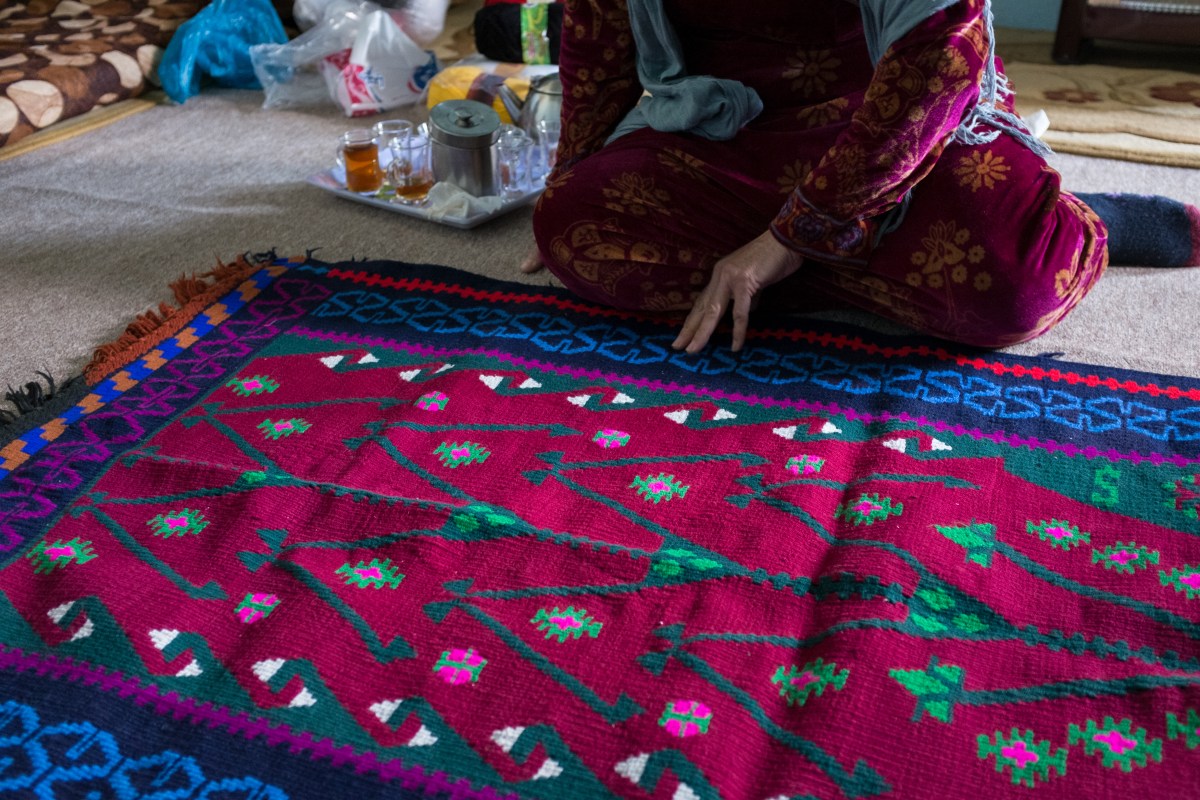
Exclusive: Watch Jessica’s Staff Call Visit of the Farm She Visited in Northern Iraq
Discussion Questions:
- Erin says there’s a common refrain amongst our western friends: Home is who we’re with. Home is where the heart is. Home is wherever I’m with you. After listening to this episode, what happens when you unpack that sentiment?
- When sharing about the shepherd family, Jessica says, “When we help people start jobs that allow them to go home, or to stay at home, we’re usually just thinking about the people who are right there. But never before had it occurred to me how important being at home is for being found.” Why is this important?
- Erin says that in marginalized, indigenous communities, there’s a strong feeling that home is something connected directly to your identity. How has listening to the true stories in this episode changed the way you view home?
If you’ve connected with our episodes this season, we want to hear from you. Which stories have stood out to you? Which ones made you think? Give us a call at (254) 300-7328 to leave a message. You can even send a text. And you might just hear your voice or hear your text in an upcoming episode.
Love Anyway is written and produced by Kayla Craig, Ben Irwin, and Erin Wilson. Skip Matheny is our digital production director. Dylan Seals is our sound engineer. Jeremy Courtney, Jessica Courtney, and JR Pershall are executive producers. Featured music was provided by Sleeping at Last and Roman Candle.
Don’t miss an episode. Subscribe now on apps like Apple Podcasts, Google Podcasts, and Spotify.
Additional Resources
Full Transcript
Erin: Just what is it that makes home feel like home? As our work with Preemptive Love has shown us, restoring homes ruined by war is a first step to bringing whole communities back to life. Every pane of glass, every doorway secured, every kitchen and bathroom refurbished gives one more family what they need to come home, so they can start rebuilding the rest of their life.
MUSIC
I’m Erin Wilson, Preemptive Love’s senior field editor in Iraq. For the first season of the Love Anyway podcast, we’ve peeled back the curtain to the kind of work that we do. We’ve examined the kind of posture that commits to being the first in and the last to leave. We’ve looked at what it can mean to be the type of people who choose to love anyway, in the pursuit of ending war.
In episode 1, we traveled back to the time when our aid delivery team was stuck in the crossfires of ISIS and US coalition forces in Iraq. We talked with Sadiq, who offered water to the lips of his enemy. And in the wake of terror attacks against Islam, we visited a mosque in the middle of the American Midwest. In episode 4, we examined the borders around our hearts as we heard from Hondurans who traveled to the US/Mexico border. And in our last episode, we learned that millennials in Iraq have big dreams, and big skills to achieve them.
And now we’re here, in our final episode of the Love Anyway podcast’s first season. We’re so glad to have you with us.
This is episode six, “The Way Home.”
MUSIC
Jessica: So now what I do when I get that itch, to move or to go back to the states or things are feeling hard, is I just kind of dig in a little deeper wherever we are. So I’ll paint a room or buy new curtains or change linens. Just as like this recommitment that this is where I am, this is the place where I am. And I’m choosing that this is a choice, maybe it’s more a reminder that this is a choice for me to be here. And I know not everyone has that choice. But for us, it’s those little significant moments of committing to stay that help it feel like home for us.
Erin: Jessica Courtney founded Preemptive Love with her husband, Jeremy Courtney and a few friends, in 2007. Jessica has long believed we should do more for those whose lives are disrupted by war—not merely helping them endure the present, but empowering them to reclaim their future.
As the refugee crisis exploded in Syria and Iraq, Jessica began forming relationships with displaced women. Today, she leads our refugee job creation program, benefiting displaced people from all backgrounds in Iraq and Syria.
Our Syrian and Iraqi friends, those who were displaced, are creating home out of a complicated environment. Many of them have lost their family homes due to war, and find themselves in a one-room tent. I asked Jessica about what she has seen her friends hold onto in this flux. What makes home for them?
Jessica: Yeah, I think It’s really interesting to talk to people and to ask what they held onto, what they brought with them. I have a friend Jamila. And she brought these carpets that she made as a little girl with her mom. And they had these massive looms in their houses in Syria. And they would like painstakingly you know, thread every single yarn through the loom to make a full carpet and those were the things she didn’t want to leave behind, that she brought with her.
Everything else felt replaceable to her, but those held really important significant memories for her. And she doesn’t think she can ever be able to go home. She lives within an area that has been in conflict her whole entire life. And so for her, leaving home was a final kind of goodbye, it was a final decision to go make home elsewhere. For others, they…like our soap-making friends, they long to go home.
Erin: Home. There’s a common refrain amongst our western friends: Home is who we’re with. Home is where the heart is. Home is wherever I’m with you. But what happens when you unpack that sentiment? Time and time again, we’ve heard about the importance of place from our Iraqi and Syrian friends who have been displaced—quite literally removed from their place. We’ve touched the items they’ve clung to dearly. We’ve sat on the floor, in the rubble, where storied homes used to be. Place, it seems, matters more than we might think.
Jessica has traveled across Iraq and Syria to witness this first-hand.
Jessica: They know they can’t be where, where they would prefer to be. They have to create a new home. And then for those who have moved home, it’s it’s baffling to drive down roads and see people that have just had nothing else but to hang plastic over all of the broken walls and the broken-out windows of their apartment buildings, to be the only people living in the apartment building and they still climb the stairs to the fifth floor because their home is the most important place for them.
Jessica: This is a really lovely house. One amazing thing as we’ve been going through houses and driving by buildings, even in refugee camps that I have noticed about Syrian people is that they’re incredibly artistic and beauty is so important in the midst of the worst rebel. I have seen the most beautiful things created.
So now in Syria, as people are going home, one woman told our team this month that if she has one wall, it’s still home. And that’s where she wants to be. And she’s so tied into that place.
MUSIC/TRANSITION
Jessica: Okay, so I can’t believe the Internet is holding but we are standing out here in Sinjar with the farmers that we helped start their farm a few months ago. in Austin Ashley, you’re on here. This is the update that you’ve been waiting for.
Erin: Our Preemptive Love team gathers weekly on a digital video call. We join in from all corners of the world. Last week, Jessica joined us from the field on a trip to Sinjar, a town in northern Iraq. Just five years ago, the Sinjar Massacre happened at the hands of ISIS—the genocidal killing and abduction of thousands of Yazidis, an ethnic and religious minority here in Iraq.
But as our team was about to see and hear, Jessica wasn’t giving us an update about destruction. This was an update about redemption. About going home.
Jessica: So I have been eating cucumbers all afternoon because they have so many cucumbers growing, that they’re selling that they’re feeding us and everyone around them. It’s super exciting. These guys are so funny. They’ve been telling us all kinds of stories and they’re so excited about their land and they’ve been very, very clear about what we helped them with and what they have continued to do on their own. Their buy-in to their job is phenomenal.
Erin: These farmers, a group of three brothers and their sons, farmed their land in Sinjar together for 30 years before ISIS came and destroyed their way of life. They were extremely anxious to get cucumber seeds planted in the ground earlier this Spring. They are intimately aware of the particular micro-climate in this place, and didn’t want to miss out on yet another chance to grow, harvest, and provide for their families.
Jessica: It’s been iso fun to be with them, so I thought I would just let them hop on the call here and chat with you a little bit you’re not going to understand, but we’ll try and translate with you but first I’ll let you say hi…
Farmer: Thank you very much! [laughter]
Jessica: So, I’m not translating all of that right now because I can’t even remember it all. But yes, he said thank you so much for the irrigation pipes and the seeds and the greenhouse…um…they..guys, we have had the best time out here this afternoon. Like this shouldn’t count as work. Because they have been so fun, the way that they fed us. He just took me to see his house. Do you guys want to see it? Should I take you over there? Do you we have time?
JR: Yes, please!
Erin: That was JR, our chief operating officer.
Jessica visited this farm in Sinjar with a few of our Preemptive Love team members, including Ihsan. You might remember him from episodes 1 and 2 this season. Yes, he’s still with us, documenting projects that donors make possible. You heard from him when his primary role was documenting emergency aid deliveries. But on this trip, he was doing something a bit different. He was recording the first harvest of a farming family in Sinjar, able to return to work their land and slowly rebuild their homes, thanks to people all over the world that partnered with them through a job creation grant.
Jessica: I’m kind of standing in the middle of things. So Here you can see Ihsan. And he’s with one of the farmers. And the greenhouse, that greenhouse is full to the brim of cucumbers. And yeah, they’re really delicious. Then there’s fields all around.
Farmer: Thank you!
Jessica: [laughs] Another thank you. 04:07 I’m going to take you here. Can you see that green generator? We bought that for them because their well was completely destroyed. So we bought the generator and we helped them by buying this pipe so that they could run the irrigation water all the way into the cement blocks 04:35 and the cement blocks are getting to the house
I asked if we bought the irrigation pipes and he told me that we bought 40 of the pipes and they’ve added another 80 pipes to this. So the pipes run to the greenhouse. And they run to like all of these fields that you can see here. And then on the other side of the greenhouse, I don’t know if you like as far as you can see here, this is their land, that they’re planting. It’s unbelievable. And now we’re going to go to the house.
Erin: As we do with everyone we partner with, the first thing we do is listen. Listen to hopes and needs. We asked what they needed to bring their farm back to life, and then partnered with them to provide practical elements like seeds, irrigation pipe, and a generator. As farmers, getting a crop into the ground was their first priority. The houses would wait.
Jessica: So here we are at their house. You can see..it’s a little bit…this one’s just a little destroyed.
But this was like the main house and it’s actually not in such a terrible shape that they couldn’t live here. They had to have to build some walls. This is this that you’re seeing right here is very similar to what we see with the houses in Aleppo that we’ve been rebuilding.
All of these…this pile of concrete…was his brother’s house.
Erin: By this time on the staff call, all 40 of us were riveted to our screens. We somehow went from laughing and hearing about cucumbers to walking through, in real-time, their home in Northern Iraq. A home in shambles. Jessica said, “it wasn’t in such terrible shape”. But let me paint a picture for you: Walls gone. Windows blown-out. A pile of concrete where a brother’s house once stood. That’s what counts as “not terrible shape.”
MUSIC/TRANSITION
Jessica: See this thing sticking up right here? This is some kind of artillery. And I don’t know, right there is like plastic off of the bomb. And they were going to start trying to rebuild here. When mag which is like the mining organization came and told them, they shouldn’t be building here and they shouldn’t have their children out here because all of this could explode at any minute. So they’re on a list to like if someone stepped on the wrong thing…So they’re on the list to have all of this removed. But their house is about 100 meters from where the front line was whenever the Peshmerga freed Sinjar. So they know that their house was used by ISIS.
And there’s, there’s just a lot of destruction here.
MUSIC
Erin: The Peshmerga are military forces that protect the Iraqi region of Kurdistan. They were a key ally in the fight against ISIS.
Jessica: As sad as that is, that they lost all of this, the only thing that they can say…as, as we’ve remarked on this is as we’ve been like, “I’m so sorry this happened. I can’t believe that you were able to come home. I can’t believe that you’ve been able to replant already.”
They just keep saying to us, like, “But thank God, like we are all here. And our kids are all here with us. And we have the opportunity to rebuild because you came and helped us.”
Jessica: It might sound arrogant, but I don’t mean it in an arrogant way: Everyone that we have encountered today has said so many organizations have come to our city, but nobody helps like you help. You listen to what we need.
And I just keep having to say to them, you’re the one doing the work. Like, we might be partnering with you to make the work possible. But you’re the one that’s actually putting your hands to that work every single day, rescuing your own selves and your own people. And that we get to be an organization that does that makes me really, really proud. So I’ll let y’all get back to the meeting. And we need to get on the road because it’s almost sunset.
MUSIC
Erin: For many Westerners, there’s an idea that home is the people we love and live with. Not our things. It’s a nice sounding sentiment. But it makes me wonder if this way of thinking stems from a culture built on immigrant roots. Because one thing that is true here in the Middle East and one thing that causes so much suffering for people like the Yazidis, often considered minority communities in Iraq — but who are in fact indigenous communities — is that there’s such an incredibly strong feeling that home is something connected directly to your identity. Where you’re from, if you’ve been persecuted, if you’ve experienced genocide…if you can prove you’re from a place, maybe it somehow validates your worth.
And when that is taken from you? It somehow erases your worth. Terror groups like ISIS know this all too well.
And if home is where your people are…what happens when your people are…gone? Lost to the devastation and destruction of war? Where do you even begin?
As Jessica has experienced as she has walked alongside her Syrian and Iraqi friends, you begin by taking one step.
Jessica: Sami and Fahti are these amazing Shabak men who we met in a displacement camp here in Iraq. Their village was one of the last ones to be taken over by ISIS from my understanding, kind of on the outskirts of Mosul, and it
Erin: Sami and Fahti are Shabak, a distinct people group in Iraq who have found themselves the targets of persecution more than once, most recently by ISIS.
Jessica: And when we met Sami and Fahti, they were doing whatever they could to take care of their families, and they had taken a one-week carpentry course. And out of that carpentry course, they were trying to figure out how to get tools to build things for people in the camp. And what they found is that wood here is really expensive.
They have a knack for it. They had the ability for it, and the imagination for it, but people just couldn’t afford for things to be built out of wood. And when we met them, we were talking to men about learning how to build windows out of PVC, plastic, and out of aluminum that also that skill would allow them to build kitchen countertops, tables, stools.
And it actually played a really key role in helping them to return home because once their village was free, they had everything that they needed all the supplies for their business, to both restore their own home.
And to then help other people restore their homes to open their business. And they moved home with all of their equipment, they packed up everything inside of their tent, went home and moved into a space that ISIS had just destroyed for the sake of destruction.
MUSIC
You could tell as you walked into their home, that it was a really beautiful space that they had invested a lot of money to tile walls and floors and put up chandeliers…
Erin: Sami and Fahti returned home to find all of their belongings were stolen. Even the electrical panel, switches, and sockets were taken from the walls. This didn’t surprise the brothers. What they didn’t expect was the level of destruction. What couldn’t be stolen, like the ceramic tile on the walls and floors, was smashed to pieces. This kind of destruction just seemed so unnecessary, so… vindictive.
Jessica: And ISIS had like literally taken chisels and hammers and pried the tiles off the walls, they had ripped out the electric wires so that they could be used somewhere else they sold the tiles to be used somewhere else.
But because of the work they had, they were able to move home and first things they reinstalled their windows and reinstall their doors and slowly started building back up.
The joy of moving home and having the ability to provide for their families allowed them to start thinking about other people right away. I was so impressed when we were there just a couple of weeks after they moved home. And they’re talking to me about the school. And all of these students who needed a teacher and books and would it be possible for Preemptive Love to help them get those things at the school. But they weren’t, even though I’m sitting in their house that still needed so much work. They weren’t asking for themselves because they had the ability to provide for themselves. They wanted to be providing for themselves. And instead, they had already turned their gaze to helping other people and seeing if we would be a part of that with them.
Erin: And they were really insistent that anytime we pass through town on the way to Mosul or on the way back, that we needed to stop in and visit, like they were very insistent on wanting to host us well in their home. In their home.
Jessica: Yes, absolutely. And they wanted us to come back and see their orchard. I remember walking through the orchard and them showing me the trees that had been burned and telling me about what it was before and all that they had.
Erin: Even more painful than the loss of their homes, was the loss of their orchard, cut down to nubby stumps and charred black. These trees were generations older than Sami and Fahti. In fact, they chose the site for their houses because of the location of this orchard.
Jessica: In a way that showed the loss, but more importantly in a way that showed the hope for what was going to be again, they were so grateful to be home and able to imagine and dream about what it would be and the people that they could welcome there.
Erin: That was one of the things that struck me most was before long before they finished the house, they started replanting the orchard. Yeah, they were already thinking about home for their kids and their grandkids before they had their own immediate needs met. That was pretty amazing.
Erin: We’ll be right back.
SHOP AD
MUSIC
Erin: I sat with Jessica in our office recently, and asked her to share a story of something that happened a few weeks back, with some shepherds that Preemptive Love helped to regain a flock of sheep. Their ability to stay home proved essential for their family. More than we could have ever expected.
Jessica: I think it was back in January, we found this village of shepherds who had moved home. But they didn’t have any sheep left because all of their sheep were stolen from them. And when we asked them what they needed to be able to stay home and be successful. They said: We need sheep we need, we need a business. And so our team was able to take them sheep and help them just build up their flocks again. And we thought we did a really great thing we thought, you know, everyone was so happy whenever they receive the sheep. We thought it was amazing that they could be out in this remote village and still be able to take care of themselves. And we thought we were done that they would be successful.
Jessica: Amazingly, even the sheep that as we were delivering them or giving birth to new sheep, so the flock was multiplying in front of our eyes and their eyes upon delivery, it was really beautiful. And then we had no idea what was coming next. But something even more beautiful was coming.
MUSIC
Erin: A little background here: The family are Yazidis, displaced from their home in Sinjar much like the farmers we heard from earlier. Most Yazidis who were forced from their homes in 2014, who survived the genocide, have been unable to return home.
PBS News Clip: Refugee camps dot the countryside in the Kurdish region of Iraq, where almost two million people have been forced from their homes; 29,000 people are living in this camp alone. Most of them are Yazidi, and almost all of them are missing family members.
The Yazidis are a small community of less than a million people, found primarily in Northern Iraq. A private and conservative community, they practice an ancient religion. Last August, members of the Islamic State group, also known as ISIS or ISIL, attacked the Yazidis, whom they consider heretics. These pictures of Yazidis trapped on Sinjar Mountain stunned the world. Hundreds of thousands fled for their lives after I.S. fighters executed many of the men and took thousands of women and girls as slaves.
Jessica: And these families, one of the dads called us a few weeks later and said, My daughter by on she’s home. She was rescued from ISIS, and they brought her home, thank you so much for giving us the sheep because it allowed us to stay at home so that she could find our homes so she could be returned to us. And it’s something that I will never forget in my whole life.
MUSIC
Jessica: Because when we help people start jobs that allow them to go home, or to stay at home, we’re usually just thinking about the people who are right there. But never before had it occurred to me how important being at home is for being found.
Jessica: You know, since that story, I’ve been thinking a lot about being lost. And, and the thing that I tell my children, and that my parents always told me, is that if you’re lost, if we’re somewhere and you’re lost, just stay where you are. Because if you’re walking around and we’re walking around looking for you, we’ll never find you. And somebody has to stay put. And the only way that that can happen is if families are able to go back home.
Erin: Able to go back home. In the beginning of this episode, Jessica talked a bit about her friend Jameela, the Syrian woman who, in the midst of devastation, rescued the handwoven rugs she had made with her mother. What is home to Jameela?
On another staff call in November, Jessica shared more about what remaking home means to her close friend.
Jessica: Jameela became a really dear friend to me as she came on board with us. And she went from being a woman who needed our help to be kind of like the women’s mayor and advocate of the entire camp. She hosted everyone in her home, would invite women over when she knew we were coming, and advocate on their behalf to see that all of their needs were met, not just their needs for business, but medical needs. And psychological needs. She wanted to be that safe place. And she absolutely became that in the camp. She’s just become like a mom and a sister.
MUSIC
Jessica: We found out maybe two weeks ago that she got her visa to go to Germany. And it’s such exciting, amazing news, and so bittersweet because this is exactly what we’ve been praying for years with her. I sat in her house over, I don’t know, it was like a year and a half ago when she was invited to go to either Canada or the UK. Until they found out that she had a husband living in Germany. And then they took her name. They told her she could divorce her husband and still leave. Or they had to remove her name from the list.
And I remember her saying to me, Jessica, what do I do, but my heart is already in three places. How can I stretch it to four?
And because she has parents and family in Syria, she and half of her like she and her sons were here in Iraq and her husband was in Germany because he had to flee, to take their son there because he needed a surgery that couldn’t be done here. And so he made sure his wife and his other sons were safe in the camp.
And he did make it to Germany and their son has gotten the medical care they need. So finally she gets to go. And we’re really excited for her. But it has been been. It’s been a really sad week for those of us here because it’s been hard to say goodbye to her…that’s the first promise that I broke to her. I told her if we went today that we wouldn’t cry. It wasn’t possible to not cry.
There’s been so much life together. And so many ways forward. And then she also told us that she hoped her home would always be used to gather women together in that place.
MUSIC
Erin: As we wrap our first season of the Love Anyway podcast, I can’t help thinking, again, what an incredible privilege it is to walk beside our friends in countries crushed by war, and too often misunderstood by most of the world. From re-living the longest night in an Iraqi desert, with colleagues scarcely a breath away from death, to tasting the first cucumber harvest of a Yazidi farmer rebuilding his life again in his homeland, we hope these true stories of resilience and choosing to love anyway have encouraged and inspired you to take risks, press into pain, and experiment with your life for the sake of love.
Loving well, across enemy lines, whether in our own neighborhood or across the world is hard! There are no simple stories here. The kind of love that changes the world often happens in all the shades of grey between black and white. But our time, energy, resources, and our voices are worth nothing less than the investment in each other.
Visit our show notes at preemptivelove.org/podcast for videos from Jessica as she visits homes we’re remaking in Iraq and Syria, and the tour she gave our staff, fresh cucumber in hand, of the farm in Sinjar. And as always, you can find discussion questions and photos for this episode, along with the other five episodes from season one.
This season might be over, but we’re just getting started. Make sure you’re subscribed to Love Anyway so you don’t miss an episode. We’ll be launching season 2 in July. Over the summer we’ll continue to tell these true stories of what it looks like to proactively, preemptively work to end war through love.
And…we’re still a new podcast. One of the best ways you can help others hear our stories is to simply leave a written review on Apple Podcasts, and share on social media.
Another way you can help is to give to support the work we’re doing on the frontlines. Link arms with farmers in Northern Iraq and now-stable parts of Syria as they remake home. Come alongside soap makers who are creating businesses and providing for their families. Join us in empowering shepherds by providing sheep. We can’t live these stories without you. Give at loveanyway.org.
FRONTLINE AD
The Love Anyway podcast is written and produced by Kayla Craig, Ben Irwin, and Erin Wilson. Skip Matheny is our digital production director. Dylan Seals is our sound engineer. Jeremy Courtney, Jessica Courtney, and JR Pershall are executive producers. Featured music was provided by Sleeping at Last and Roman Candle.

